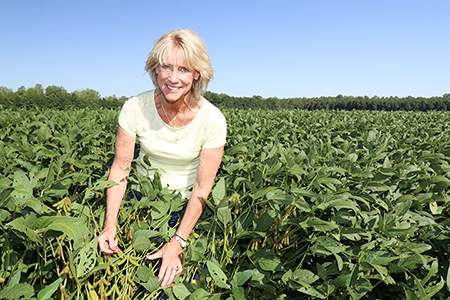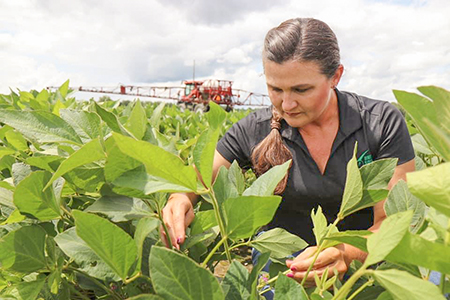New Website Brings Soybean Research To Farmers

The soy checkoff’s latest collaboration brought Qualified State Soybean Boards (QSSBs) together to maximize the results of checkoff-funded research projects in the most effective way possible: bringing the findings to farmers.

The redesigned Soybean Research & Information Network (SRIN) website — soybeanresearchinfo.com — was launched through a joint effort by the North Central Soybean Research Program (NCSRP) and the United Soybean Board (USB) to give farmers a virtual resource full of information and toolkits for more efficient soybean production.
This is a one-stop shop for all the information the checkoff has discovered through farmer investments regarding key problem areas in production, such as tolerance and resilience. Each article on the SRIN website provides insight and explanation on the research findings and links directly to the study in the overall database for further exploration.
“The soy checkoff and QSSBs have worked together to find solutions, best practices and data on key issues and have made that available for all farmers to use,” said Tim Venverloh, USB Vice President of Sustainability Strategy.
The farmer-leaders of USB and QSSBs determine which research is funded — geared toward addressing farmers’ specific and most pressing needs and uncovering opportunities to build profits for soybean farmers.
Two Alabamians are among USB’s 78 farmer-directors. Pickens County’s Annie Dee and Dallas County’s Wendy Yeager join other USB members who work on farmers’ behalf to achieve maximum value for their soy checkoff. These volunteers invest and leverage checkoff funds in programs and partnerships.
“The investments made by farmers through their checkoff helps generate new markets for soybeans and expand existing markets,” Dee said. “Our checkoff dollars help on national projects, and they also help in Alabama through such projects as the high oleic blacktop used on the national test track in Auburn and development of an engineered wood product using soy flour in particleboard.”
Other projects are clear and actionable, such as providing data on what fungicides will provide good disease control based on the most prevalent diseases that can threaten yields.
Tolerance and resilience are two issues farmers know too well, and they have been the focal points for the latest research. Additional projects have sought to combat numerous challenges, from obstacles associated with unpredictable weather patterns to insect management and variety performance. Some of these research projects include:
- Battling billion-dollar yield robbers such as stink bugs or sudden death syndrome (NCSRP).
- Navigating herbicide-resistant weeds and helping farmers adopt the practices best suited to their crop and weed populations (Missouri Soybean Merchandising Council).
- Enhancing seed quality by improving its genetics and traits based on a farm’s external factors (Southern Soybean Research Program).
- Controlling soybean seed and seedling rots worsened by diseases made more prevalent by wet planting seasons (USB, NCSRP).
Yeager said having data available in a single location benefits all farmers.
“The USB checkoff funds research and technology innovations that farmers in the field don’t physically have time for,” Yeager said. “The dollars focus on maximizing our profits in areas we never imagined and can help us maintain our focus in the field and on increasing our yields. When we are allowed to focus on the field and let the research increase our margin, it’s a win-win for all of us.”
And the work hasn’t stopped at creation of the website. The soy checkoff continues its investments in new research toward new best practices, solutions to problems and innovations to help farmers contend with rising challenges.
“State and national checkoff programs working together help make every farmers’ investment go further,” Dee said.
To learn more about the latest research and the soybean industry, visit soybeanresearchinfo.com or unitedsoybean.org.
